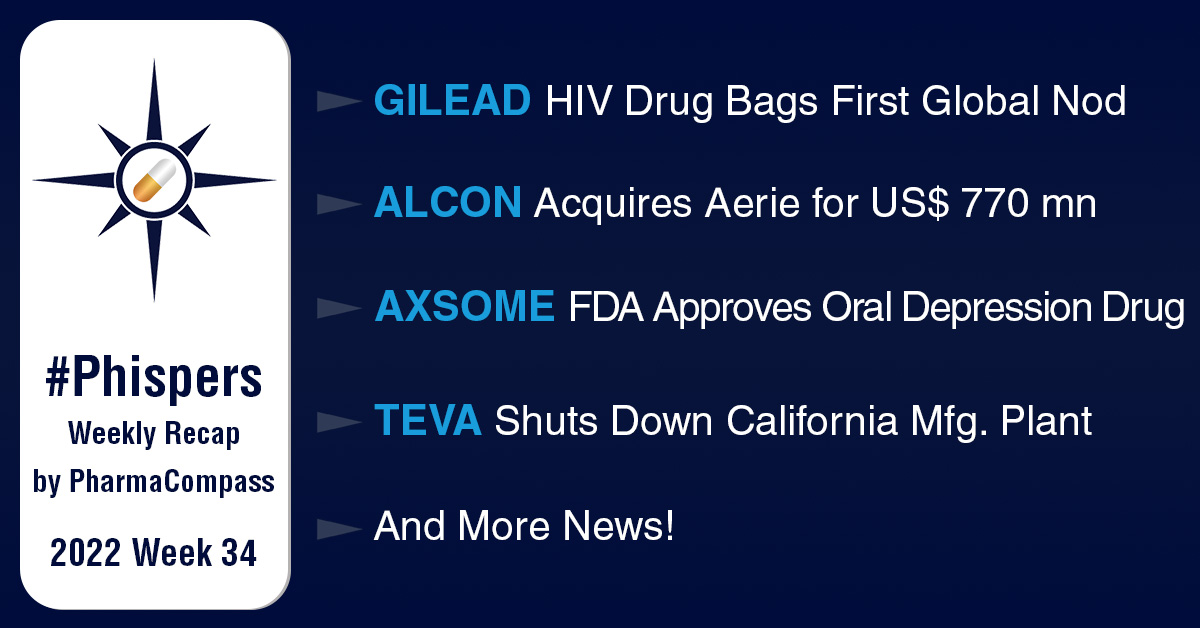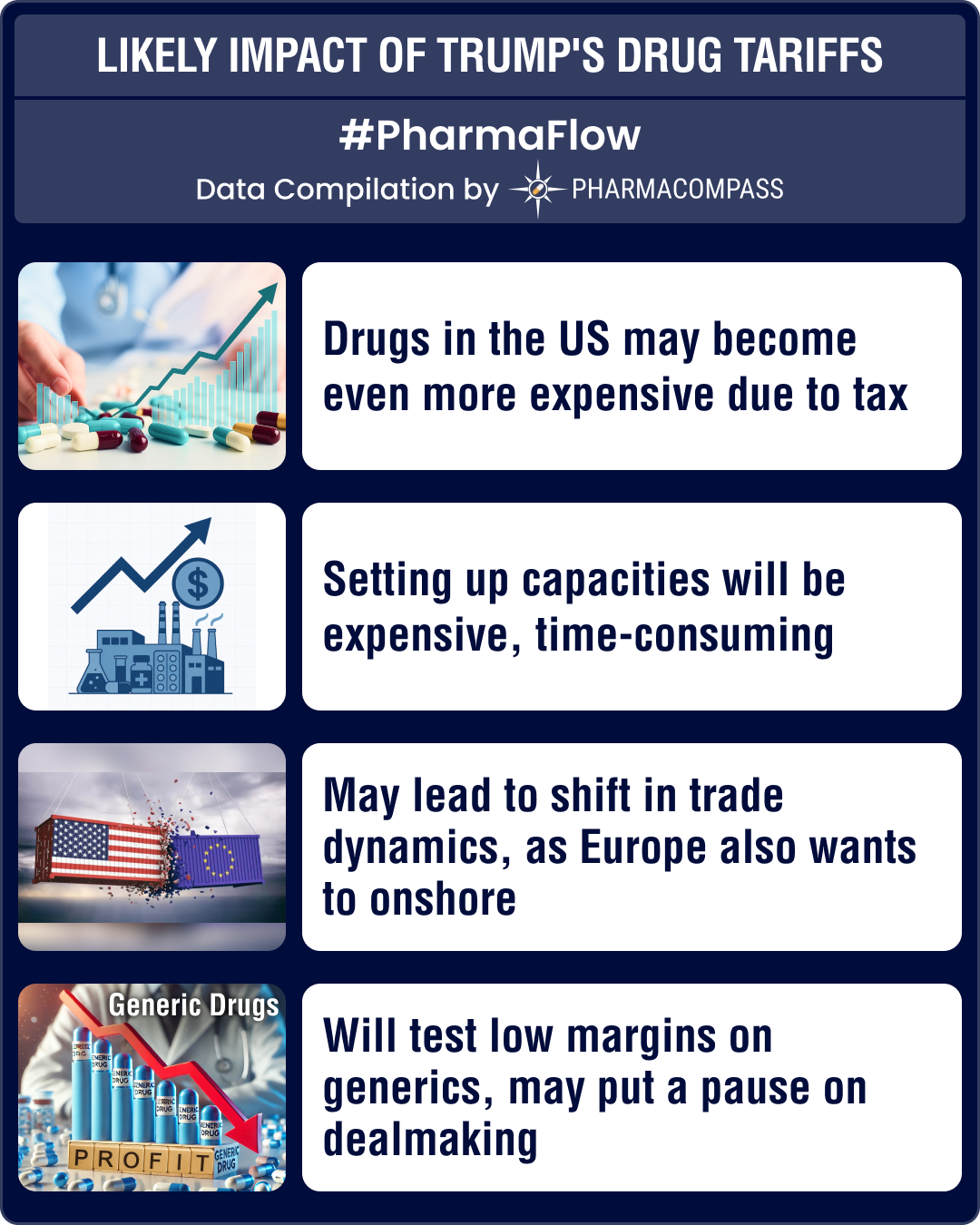
By PharmaCompass
2022-08-25
Impressions: 1,561
In pharma news this week, the European Commission has authorized Gilead Sciences’ drug Sunlenca (lenacapavir) to treat HIV patients who suffer from multi-drug resistant HIV and have no alternative treatment. This is a ‘once every six months’ therapy, to be taken with other antiviral drugs. Similarly, the FDA has approved Axsome’s Auvelity as the first rapid-acting oral treatment for adults with major depressive disorder (MDD).
In M&A news, eye care products company Alcon is acquiring New Jersey-headquartered Aerie Pharmaceuticals for US$ 770 million. The deal will give Alcon access to Aerie’s two marketed glaucoma and ocular hypertension meds – Rhopressa and Rocklatan.
In manufacturing news, Thermo Fisher inaugurated its second manufacturing facility within a week. While the first one is in Tennessee, the second site is located in Plainville, Massachusetts, and will manufacture viral vectors, which are vital for the development of gene therapies.
Teva is permanently shutting down its troubled sterile injectables manufacturing facility in Irvine, California, and laying off 305 employees at the site. Indian drugmaker Wockhardt’s US subsidiary Morton Grove Pharmaceuticals is also shuttering its Illinois site due to manufacturing issues and is planning to lay off 66 employees working at the site.
Novartis has temporarily halted dosing in a phase 2b study of an experimental Huntington’s disease drug – branaplam – after observing early signs of side effects in some participants.
In Covid-19 news, Pfizer-BioNTech and Moderna have approached the FDA seeking emergency use authorization for their bivalent booster shots targeting the dominant BA.4/BA.5 Omicron variants. The US has approved Novavax’s Covid-19 vaccine for use in adolescents between 12 and 17 years.
The FDA has said it is assessing whether some expired doses of Bavarian Nordic’s monkeypox shot — Jynneos — can still be used in order to meet the heavy demand for the vaccine.
Gilead’s twice-a-year HIV drug Sunlenca scores its first authorization in Europe
The European Commission has authorized Gilead Sciences’ drug lenacapavir (injection and tablets) to treat HIV patients who suffer from multi-drug resistant HIV and have no alternative treatment. The drug – branded as Sunlenca in Europe – has to be taken with other antiviral drugs and administered once every six months after a loading period with an oral version.
This is the first marketing authorization for the long-acting capsid inhibitor. It is also the first HIV drug that targets the protein shell, or capsid, of the virus. The authorization is based on a phase 2/3 study, which found the shot, when added to an optimized antiviral regimen, helped achieve an undetectable viral load in 81 percent of patients after 26 weeks of treatment.
Last December, the FDA had put on hold 10 clinical trials after finding the vials Gilead used to hold the drug could lead to an elevated risk of glass particulates seeping into the solution. Months later, the FDA had issued a complete response letter (CRL) citing issues related to Gilead’s use of borosilicate glass. The agency lifted the hold in May after Gilead switched to aluminosilicate glass. The pharma resubmitted its approval request to the FDA in July. The FDA is slated to take a decision by December 27.
Axsome’s rapid-acting oral depression drug bags US approval
The FDA has approved Axsome Therapeutics’ Auvelity as the first rapid-acting oral treatment for adults with major depressive disorder (MDD). The nod comes a year after the agency found flaws in the biotech’s application and delayed the approval process.
Auvelity is the first oral MDD drug with a new mechanism of action to be approved in more than 60 years. The drug can help reduce the symptoms of depression in around a week, giving it an edge over other antidepressants available in the market that take up to six weeks to show effect. Analysts have predicted the drug to generate around US$ 1.8 billion in peak yearly sales.
The drug will come with a warning of increased risk of suicidal thoughts and behaviors in children and young adults. Axsome plans to begin selling the drug in the US in the fourth quarter of this year. MDD or clinical depression is characterized by persistent feelings of sadness and suicidal thoughts. Over 20 million Americans are affected by the disorder.
Pfizer-BioNTech, Moderna seek FDA authorization for Omicron booster shots
Pfizer and its German partner BioNTech have requested an emergency use authorization for their bivalent Covid-19 booster dose targeting the dominant BA.4/BA.5 Omicron variants as well as the original coronavirus strain for those 12 years and older. Moderna has also approached the FDA seeking authorization for its bivalent booster shot against the BA.4 and BA.5 subvariants of Omicron.
A committee comprising public health experts in the US is slated to hold meetings next week to discuss Pfizer-BioNTech and Moderna’s Covid-19 bivalent vaccine booster doses.
Pfizer-BioNTech said they expect to begin delivering the Omicron-adapted vaccine in October, provided they receive approval. The companies have also cited new data to claim that their Covid-19 vaccine – Comirnaty – is 73.2 percent effective in preventing infections in children between six months and four years. The vaccine was authorized for children under five years of age in June.
The European Medicines Agency has decided to hold a meeting on September 1 to discuss Pfizer-BioNTech and Moderna’s applications seeking authorizations for their booster shots modified to target the Omicron variant. Last week, the United Kingdom became the first country to green light the updated version of Moderna’s bivalent coronavirus vaccine.
FDA considers use of expired monkeypox vaccines: Facing a shortage of monkeypox vaccines, the FDA is assessing if some expired doses of Bavarian Nordic’s monkeypox shot can still be used. The agency said it is actively working with Bavarian Nordic and government authorities such as Administration for Strategic Preparedness and Response (ASPR) and Biomedical Advanced Research and Development Authority (BARDA) to find out if some expired doses of Jynneos vaccine that meet certain quality specifications can be used. Bavarian Nordic said it is also exploring the viability of using technically expired doses to reduce the gap between demand and supply. The company’s CEO Paul Chaplin said about half a million expired doses in the US’ national stockpile may still be viable.
Novavax vaccine approved for use in adolescents: The US Centers for Disease Control and Prevention (CDC) has approved the use of Novavax’s Covid-19 vaccine for adolescents between the ages of 12 and 17 years. The vaccine has already been cleared in Japan and Australia for use among adolescents.
Eye care specialist Alcon picks up Aerie Pharmaceuticals for US$ 770 million
Alcon, the former eye care business of Novartis, is acquiring New Jersey-headquartered Aerie Pharmaceuticals for US$ 770 million. The drugmaker will shell out US$ 15.25 per Aerie share to finalize the buyout.
The deal will give Alcon access to Aerie’s two marketed glaucoma and ocular hypertension meds – Rhopressa and Rocklatan. Last year, the two drugs had brought in US$ 112.1 million in sales, up 35 percent from 2020. Alcon will also get hold of a pipeline of experimental drugs, including a dry eye disease treatment which is in phase 3 testing. The companies expect to close the transaction in the fourth quarter.
Back in May, Alcon had acquired two drugs from Kala Pharmaceuticals – dry eye disease drug Eysuvis and post-operative inflammation drug Inveltys – for US$ 60 million in cash plus milestones.
Teva to permanently shut down its California plant, to lay off over 300
Teva Pharmaceuticals has decided to permanently shut down its troubled sterile injectables manufacturing facility in Irvine, California. The drugmaker is laying off 305 employees at the site, according to a California Worker Adjustment and Retraining Notification (WARN) notice.
Last year, the FDA had slapped the site with a Form 483 after an inspection found that the drugmaker hadn’t repaired water damage that led to mold and bacteria around the plant. Teva had recalled more than 2.5 million vials of drugs following concerns that the vials were contaminated with mold. In October, Teva had put a temporary halt on production at the site.
The company has either transferred or ceased the production of medicines made at the facility. Two critical products that used to be produced at Irvine – chemotherapy vincristine and stomach drug metoclopramide – have been transferred to alternative Teva sites.
The company had listed the site for sale earlier this month, according to a report published by Orange County Business Journal.
Wockhardt’s US subsidiary to shutter Illinois site: Indian drugmaker Wockhardt’s US subsidiary Morton Grove Pharmaceuticals is shuttering its Illinois site due to manufacturing issues and is planning to lay off 66 employees employed there. Last week, a federal court had ordered the company not to manufacture adulterated drugs and destroy all drugs in its facility except those that are medically necessary. Earlier this month, the Department of Justice had alleged that the company’s syrups and nasal sprays made at the facility were not made in compliance with cGMP (current Good Manufacturing Practices) standards.
Thermo Fisher opens US$ 180 million manufacturing site, its second in a week
Thermo Fisher is clearly in an expansion mode, and has inaugurated its second manufacturing facility within a week. Its new 300,000-square feet viral vector manufacturing facility, built at a cost of US$ 180 million, is located in Plainville, Massachusetts. The site will employ 300 people and manufacture viral vectors, which are vital for the development of gene therapies.
This is Thermo Fisher’s sixth viral vector plant in the United States and Europe. Thermo Fisher had announced plans to build the site in May 2020.
Earlier this week, the company had opened a US$ 105 million, 400,000-square feet factory in Lebanon, Tennessee (Greater Nashville). The facility is Thermo Fisher’s largest single-use technology plant and will employ 1,400 people.
Novartis halts drug dosing in Huntington’s disease trial after reports of side effects
Novartis has temporarily halted dosing in a phase 2b study of an experimental Huntington’s disease drug – branaplam – after observing early signs of side effects in some participants.
An independent data monitoring committee overseeing the study recommended the suspension after finding early signs of peripheral neuropathy in some participants. Peripheral neuropathy is the result of nerve injury outside the brain and spinal cord.
Branaplam is an orally administered drug which was initially designed to treat spinal muscular atrophy (SMA). In December 2021, the FDA granted branaplam ‘fast track’ designation for Huntington’s disease. The drug had also received orphan drug designation in 2020.
Huntington’s disease is a rare, genetic brain disorder that breaks down nerve cells in the brain and impacts emotions, motor ability and cognitive skills. There are no approved therapies for the disease.
The PharmaCompass Newsletter – Sign Up, Stay Ahead
Feedback, help us to improve. Click here
Image Credit : Phisper Infographic by SCORR MARKETING & PharmaCompass license under CC BY 2.0
“ The article is based on the information available in public and which the author believes to be true. The author is not disseminating any information, which the author believes or knows, is confidential or in conflict with the privacy of any person. The views expressed or information supplied through this article is mere opinion and observation of the author. The author does not intend to defame, insult or, cause loss or damage to anyone, in any manner, through this article.”








